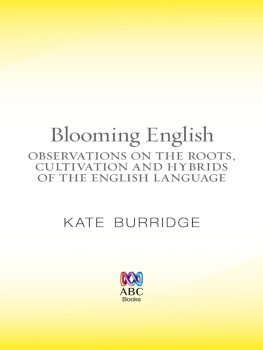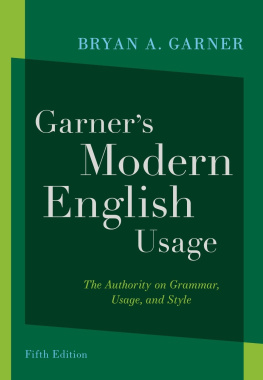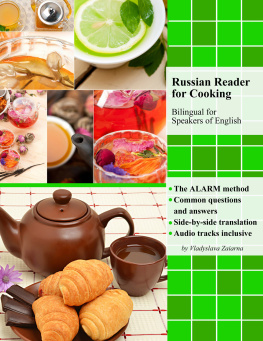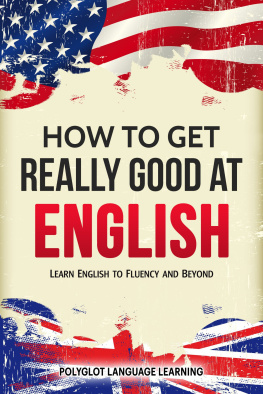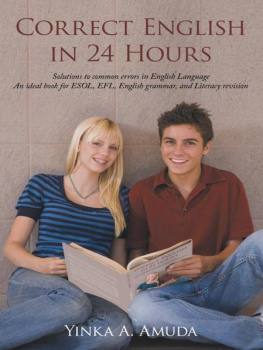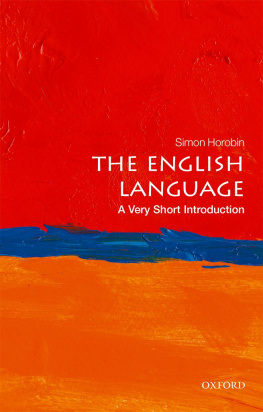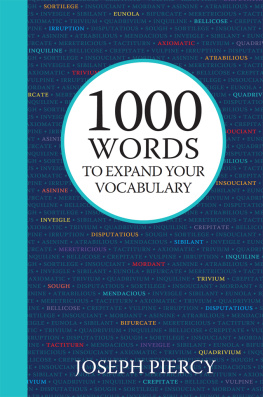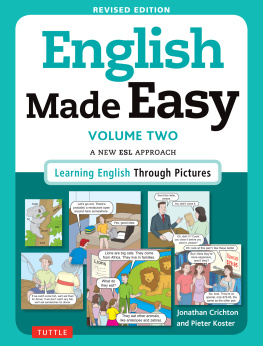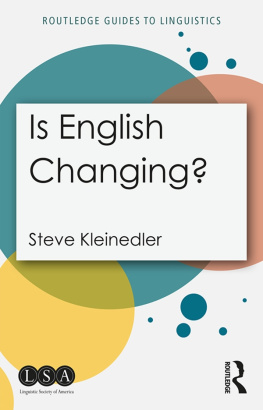BLOOMING ENGLISH
English is a most creative, changeable and imaginative language. Some words are invented to meet temporary needs and are quickly discarded; others carry meanings hundreds of years old. Language fascinates us, and we spend a lot of time playing with it, creating everything from puns, riddles and secret languages to wonderful prose and poetry. We also worry about it a great deal, looking up and checking words in dictionaries and usage guides, and arguing about definitions. This book celebrates our capacity to play with language, as well as examining the ways we use it: in slang and jargon, swearing, speaking the unspeakable, or concealing unpleasant or inconvenient facts. It is a book for browsing, for finding intriguing snippets about language, history and social customs, and a formidable weapon in word games.

Tis an unweeded garden, that grows to seed
William Shakespeare, Hamlet , Act I, sc. ii
Most of the material in this book is provided by the 180 or so radio pieces that Ive written for the Australian Broadcasting Corporations (ABCs) Soundbank . These pieces are generated largely by talkback calls during radio programmes Ive been involved in members of the public phone in to the radio station and put directly on air their observations on language and queries about usage. Very often these calls involve complaints about the language of others. We are all born with a keen ear for the ill-chosen word and the grammatical error of our fellow speakers!
Whats obvious from these calls is the tremendous enjoyment people derive from their language. Most of us love messing about with English, it seems looking up word origins, playing with language, manipulating it to create new and exciting expressions. Even something as everyday as slang illustrates over and over again just how inventive we can be. But our love of language is also reflected in the time we spend worrying about usage. Look at the hours we invest in checking things in dictionaries and style guides, thinking and arguing about the words and constructions we use especially, of course, the words and constructions that others use. What is striking is the intensity of emotion that accompanies these worries. I could never have predicted the number of furious letters and emails that followed my suggestion that the possessive apostrophe was a useless addition to the English language and we would be better off without it. Such passionate support for a piece of punctuation we imported from the French nearly five hundred years ago!
When I was trying to think of an idea that would provide a framework to unite all of the short pieces on language that Id written, I ended up choosing a gardening image. Peoples concerns about language bring to mind a picture of the English language as a garden that, if not carefully and constantly cultivated, would quickly become unruly and overgrown. As Shakespeare put it, Tis an unweeded garden, that grows to seed. Or, as one of the more passionate supporters of the possessive apostrophe put it to me we shall have no formal structure of our language: it will become unteachable, unintelligible and, eventually, useless as an accurate means of communication.
Language gardeners can be found in all sorts of associations. They promote an array of causes from Plain English and simplified spelling through to Esperanto and Klingon. There are, for example, various apostrophe support groups out there even one dedicated to the abolition of aberrant apostrophes like Pleas Flush the Toilet and Canvas Hats . As a student I became good friends with the president of another group calling itself The Society for the Preservation of Old English Strong Verbs. Strong verbs are those like thrive , throve , thriven my friend is probably one of the few persons left for whom the past of creep is still crope and the past of climb is still clomb . But equally gardeners are those folk who simply enjoy looking things up in dictionaries and usage books, who spend time thinking and talking about language, and who like punning and playing Scrabble or Balderdash. We are probably all secret language gardeners of some sort.
And there is clearly a tremendous amount of pleasure to be had pottering about in the verbiage edging, staking, cutting back, keeping bugs at bay. Why else would someone spend the time calculating that foolish could be spelt 613,975 different ways? Or that fifty million schoolchildren spend ten million hours daily on learning the English spelling system. (If thats not enough, this chap went on to calculate that this is roughly equivalent to the number of inches between London and Hull.) I mentioned Esperanto and Klingon. In fact there are hundreds of people out there all inventing languages simply for the pleasure of it conlangers theyre called, or constructed language creators. And how many of you have lain awake at night trying to figure out just what it is that rhymes with orange? What is that third word in the English language that ends in -gry ? There is even, as I write, a discussion on the Internet on this particular topic. In fact, there are hundreds and hundreds of different websites dedicated to language issues as diverse as word order, rhyming (where you can find out exactly how many words rhyme with orange ), oxymorons, idioms, spoonerisms, phonetics, backformations, clichs and collectives. Most people create these websites for the sheer intellectual fun of it.
The garden is also an image that nicely caters for the arsenal of prescriptive texts (dictionaries, style guides, usage books, grammars) that give a standard language like English much of its muscle. These are the conservatories, the greenhouses and the hothouses that nurture our language, often artificially keeping alive features that have long perished in ordinary usage. Its in these linguistic nurseries that we protect and cherish endangered constructions, words, meanings and pronunciations. The neat lists and beautifully spun paradigms inside the dictionary and handbook provide the glasshouse counterpart to the outside wild garden of language.
Why is it that people care so deeply about this garden? Is it simply because we now have these linguistic conservatories and hothouses that concerns with linguistic values and standards are so much greater? It appears not. People have been worrying about the garden for centuries. As Deborah Camerons book Verbal Hygiene clearly shows, anxieties about language are underpinned by deep and complex social conflicts. We all refuse to leave language alone its part of our linguistic competence. Humankind would have to change beyond all recognition before these urges to cultivate and tidy up the language disappeared.
So where do linguists fit in? Are they the seasoned gardeners whose task it is to advise on what should be altered, removed or promoted in the garden? Should they be the ones controlling the pests, building the hothouses and performing the topiary? Linguists are in a tricky position here. They, of course, study language, in the same way that botanists study plants and zoologists research the physiology, anatomy and behaviour of animals. Should they therefore legislate language usage? Many people probably think so. For those people theres a very clear distinction between unwanted plants in the garden and those that should be encouraged. But let me put it this way. Should biologists denigrate certain species in the plant world that the wider community views as weeds? Should zoologists attribute evil to the cane toads which destroy indigenous species of amphibian? Should linguists disparage native speakers for dropping an l in vulnerable or condemn as linguistic atrocities expressions like youse ?

